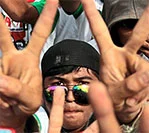The complexity and nuanced sophistication with which Indonesian voters choose their next presidential election are telling, bewildering and definitive
IN just three days, Indonesians head for the polls to choose their next president. Already, few things are as they seem.
The post-Suharto years have seen a proliferation of parties and personalities, but little by way of ideological variation or policy differentiation. It has been a decade-plus of political awakening and national pride over the country’s democratic credentials, but old habits of favouritism, patronage, backroom deals and graft die hard.
There is no doubt that democratic space has been opened up like never before. But how that space has been utilised, by whom and in which interests can tell an altogether different story.
Last April’s legislative elections had offered the people another chance to empower those candidates who could make a difference. But many familiar faces returned to fill the legislative posts.
Now the presidential election offers the people another chance. The several candidates who seemed for a time to represent wider voter choice were soon whittled away to just two: Prabowo Subianto and Joko “Jokowi” Widodo.
There is hardly any ideological distinction between their two camps. But the differences they make over who they are and what they represent make a world or two of difference to the country and beyond.
Prabowo is Suharto’s former son-in-law and ex-special forces general who had been dismissed after being found guilty of kidnapping. His is a new campaign face of what remains of an established old guard of the politics of cynical opportunism.
Jokowi is the governor of Jakarta, rated internationally among the world’s best governors for civil administration, and a fast-rising political star from humble beginnings. He is Everyman, articulating the thoughts and feelings of the ordinary citizen with empathy and a “can do” spirit.
Both candidates evidently wear the message they champion on their sleeves. Yet nearly three-quarters of the electorate still want to know what they stand for.
Even pollsters are uncertain about some of their poll findings. Through May and June, estimates of undecided voters have ranged back and forth from 13.5% through 19% and 23% to 42%.
Whatever the precise figure, it is still a sizeable chunk of the electorate. It is a chunk that the trailing candidate in the polls, which has consistently been Prabowo, hopes to convert in his favour.
Jokowi enjoys much support in highly populous Java (143 million), and it is here that what has been called a “tsunami” of smear campaigns against him and his running mate Jusuf Kalla has had some effect.
Prabowo’s Gerindra party and its allies, spending less than Jokowi’s PDI-P and its coalition partners, run a more closely targeted campaign. The smears have involved rumours of a Jokowi presidency raising the prices of fertiliser and other basic necessities. That appears to be an alarmist projection, at best, of Jokowi’s stated intention to curb subsidies in his first presidential term.
The Prabowo camp’s appeal, however, seems disproportionately founded on institutional leadership rather than the rank and file. Among Muslim groups for example, Prabowo-Hatta enjoys leadership backing while Jokowi-Kalla enjoys more support from ordinary members.
Jokowi’s support also covers particular grassroots constituencies, including women and rural voters. There are signs that Prabowo and his allies are getting nervous.
A recent rumour floated online that Prabowo had beaten Jokowi in opinion polls. But even after it was revealed as a hoax, the Prabowo team kept insisting they were leading.
The Prabowo camp also upset schoolteachers after sending requests at their schools to elect him. They were against any attempt to politicise their workplace.
And in the lead-up to Golkar’s expected endorsement of Jokowi, the party hierarchy switched its support to Prabowo even after senior party leaders including the president backed Jokowi. This shocked Kalla, a former vice-president of the country and now Jokowi’s running mate as vice-president again.
Then came the witch-hunt: several Golkar members were sacked for not following party instructions to endorse Prabowo. Kalla condemned the sackings and challenged the party to sack him too.
Many fear this heavy-handed top-down approach may denote Prabowo’s style as president. While it may appeal to certain institutional leadership quarters and elites, it pays little heed to popular concerns.
Different surveys disagree whether Prabowo can trump Jokowi if he manages to convert all the undecided voters, which is highly unlikely or virtually impossible. That only shows the disparities between the different estimates of this group.
Prabowo, a nationalist by reputation, is not without his lobby allies. These have lately included former or current leaders of sectarian religious groups and militant extremist organisations who have proclaimed him as “war commander”.
But what do religious extremists, ultra-nationalists and the political old guard have in common going into an election? Apparently, general bigotry, sectarianism and intolerance, along with nostalgia for the firm thwack of authority.
Prabowo’s motley crew have said as much against minority groups and even cast doubts about Jokowi’s race and religion. It is a highly dangerous approach that can inflame a country or a region.
The question beyond Indonesia is that if Prabowo wins, what can that mean for a pluralist region? Indonesia has long vied for regional leadership, but Prabowo has proclaimed his opposition to pluralism.
Whatever the result, this election will be a very decisive one for Indonesia and the region.
Article by Bunn Nagara which appeared in The Star, 6 July 2014.





